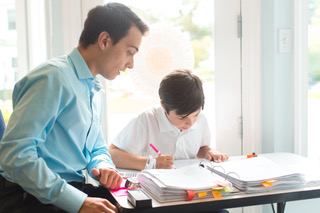
As a scientist-educator who has been providing private academic acceleration services for more than 20 years, I have experienced homework as a major destroyer of family life for two primary reasons: students either “can’t do” or “won’t do” their assignments.
In the “can’t do” scenario, a student hasn’t adequately learned lessons in the classroom and, thus, can’t effectively complete their homework assignments. In the “won’t do” scenario, a student understands the lesson but just doesn’t want to do their homework. Here we have a motivational issue rather than an issue relating to skills deficits.
“Can’t dos” should be the teacher’s responsibility. It’s the teacher’s job to educate your children and if they have failed to do that properly, then they should be the ones to fix it.
With more than 60% of American students scoring below proficiency in all academic subjects, it is clear that a majority of students do not effectively learn and master skills in the classroom. More often than not, students come home from school expected to complete assignments that they don’t understand. As a result, students experience frustration and anger, which is typically directed at their parents. Parents either respond by attempting to act like teachers or by becoming frustrated and angry themselves. This unfortunate state of affairs leads to a lot of unpleasant evenings in households across the country.
If you suspect that your child hasn’t adequately learned a lesson, then you should communicate this issue to your child’s teacher rather than trying to teach your child the lesson yourself. Parents shouldn’t be expected to be teachers at night. Children attend school for 7 hours per day, 5 days per week. If schools fail to provide adequate instruction in this amount of time, it should be the schools job to fix that problem…not the parents. When parents provide lots of prompting or even complete a child’s assignment for them, it prevents teachers from knowing when their instruction has been inadequate. Like all humans, teachers need feedback to improve their performance. Without being informed that students in their class aren’t learning effectively, instruction can’t improve. We would never expect a customer to go back into the kitchen at a restaurant and fix the meal they ordered if it wasn’t cooked properly. Yet, parents are expected to fix the instructional flaws of teachers on a daily basis. Parents should stop enabling ineffective instruction by letting teachers know when their instruction has been ineffective.
On the other hand, “won’t dos” are motivational issues that parents must learn how to properly address. Things that many children just have free access to shouldn’t be viewed as rightsbut as privileges, and privileges should be earned. Screen time is one such privilege. Children shouldn’t have unlimited access to their electronic devices. They should earn access to electronics by completing their homework. When kids arrive home from school, their devices should be put away and the T.V. should remain off. Kids should be granted some free time when they first get home from school, but this free time should not involve screens. They should go outside, get some exercise, or play with a friend. However, screens should be withheld until homework is completed.
Many parents remove electronic devices as a punishment for “bad” behavior, but this is actually a flawed practice. Removing a device implies that it is something a child should always have. Devices are privileges that should be earned and access to them should be made contingent upon the completion of something more adaptive like completing homework or helping around the house. Kids shouldn’t LOSE screens based on maladaptive behavior. Kids should EARN screens based on adaptive behavior – like completing their homework.
When parents redesign their households such that privileges are consistently being earned for homework completion, it becomes much easier to decipher “can’t dos” from “won’t dos”. If a child struggles to complete a homework assignment, but actively works to complete it, then this effort should be reinforced with access to privileges of some sort – like screen time. Even if completed incorrectly, the parent should leave the assignment alone and send a note to the teacher communicating that their child requires more effective instruction over that lesson. As I previously stated, teachers need feedback regarding their instruction.
Children also need the kind of structure put into place that will strengthen their adaptive skills – like completing homework assignments. Parents should act like the CEO of their households and be in charge of when their children get paid. Children shouldn’t get paid for sitting around staring at a screen. They should get paid for hard work so that they eventually acquire the kinds of skills that will enable them to discover their own greatness. Mastering skills and developing a work ethic isn’t inborn – it’s learned. Schools must do their part and parents should too but knowing who should play what role matters. Teachers should effectively teach academic skills in the classroom. Parents should strengthen their children’s adaptive behavior by designing effective motivational systems in the household. In this way, schools and parents would be working together to produce successful students and happy households.

